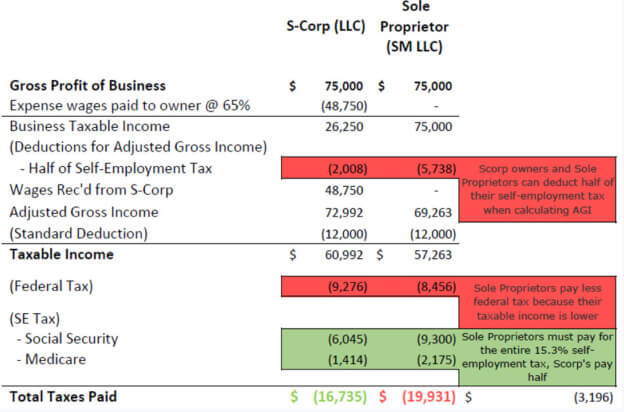How S-Corps create savings (S-Corps defined)
The differences between S-Corp taxes and Sole Proprietorship or Partnership.The major savings come when you factor in Self-Employment tax. More specifically, a sole proprietor’s entire profit is subject to self-employment tax. This means that if you’re a sole proprietor and your business makes a profit of $160,000, the employment tax on this profit would amount to around $24,480. Unlike S corporations, sole proprietors aren’t issued W-2 wages; they bear full self-employment tax and no payroll tax.
On the other hand, S corporation profits are not taxed as self-employment income, markedly reducing tax liability. The only income that an S corporation pays payroll taxes on is the W-2 wage that it pays to its business owners. Using the same profit figure of $160,000, if an S corporation issues a W-2 wage of $100,000 to its owner, the employment tax on this wage drops to $15,300. This represents almost a $10,000 savings versus sole proprietor on self-employment tax!
But wait there is a catch…. S corporations are required to pay the business owner a “reasonable wage”. This wage is subject to employment taxes and constitutes business deductibles, striking a balance between S corporations’ tax savings and IRS’s tax collection.

A quick way to know if you should consider an S-Corp
First, the lower your net income, the less beneficial an S-Corp will be for you. Unfortunately, there’s no magic number that indicates it’s time to switch.
However, if you’re not making at least $40,000 in net profits annually, you probably won’t benefit from switching to or starting an S-corp.
Drawbacks of an S-Corp
- They’re more expensive and time-consuming to set up.
- They’re more work to maintain and have additional reporting requirements than other business entities.
- You’ll likely need to hire a certified public accountant (CPA) or other tax professional to calculate a reasonable salary and file your taxes.
- You must have the cash flow to sustain regular payroll runs, payroll taxes, and payroll service fees.
For some, these drawbacks far outweigh the individual and business tax savings, while for others, the upfront costs are totally worth it to save money on an ongoing basis. It depends on your long-term goals with your business and personal finances.
The cost of your S-Corp service provider could make all the difference.
GET STARTED